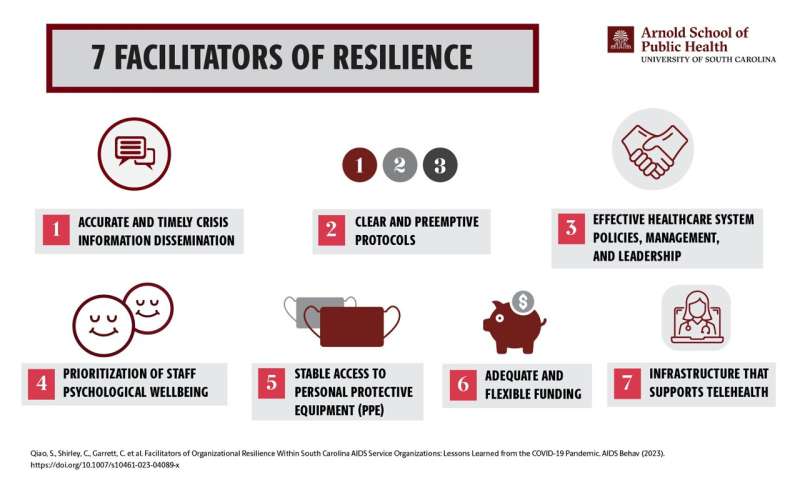This article has been reviewed according to Science X's editorial process and policies. Editors have highlighted the following attributes while ensuring the content's credibility:
fact-checked
peer-reviewed publication
trusted source
proofread
Researchers identify key takeaways for AIDS service organizations to ensure resilience

The COVID-19 pandemic overwhelmed health care systems across the United States. More than 100 million cases and one million deaths later, clinicians and researchers are still unraveling the lessons learned from this global public health crisis.
In a recent publication in AIDS and Behavior, scientists from the University of South Carolina identified seven lessons regarding health care system resilience learned from the COVID-19 pandemic. Specifically, these takeaways detail ways that AIDS service organizations in South Carolina were able to persevere through the pandemic. Taken together, these facilitators may offer a roadmap for organizational resilience when faced with the next public health crisis.
"Throughout the pandemic, South Carolina has been categorized as highly vulnerable to COVID-19 infections, complications and deaths due to our unemployment levels, limited income, housing and transportation instability, crowded living and working conditions, and aging population," says Shan Qiao, associate professor of health promotion, education, and behavior and a core faculty member with the South Carolina SmartState Center for Healthcare Quality. "These conditions worsened existing health disparities and put a strain on the local health care systems that vulnerable groups depend on to manage chronic conditions, such as HIV/AIDS."
With the eighth highest rate of HIV/AIDS incidence in the country, South Carolina has a population of nearly 18,000 residents who are living with HIV. Supply chain disruptions (e.g., safety equipment, pharmaceuticals used prevent and treat HIV), staffing shortages, capacity limitations and other challenges resulted in disruptions to services offered by 82 percent of the state's HIV clinics at the beginning of the COVID-19 outbreak.
Researchers at the Center for Healthcare Quality have been examining impacts of the pandemic on people living with HIV, including service delays/interruptions, mental health, co-infection with COVID-19, vaccine efficacy, stigma, viral suppression, and more. Qiao's study sought to identify recurring themes among AIDS service organizations who were better able to overcome many of these challenges. Their analysis resulted in seven facilitators of organizational resilience.
"These facilitators are unique to the context of the COVID-19 pandemic yet are relevant going forward, as this study highlights their importance in providing a continuity of care to people living with HIV and other vulnerable groups under circumstances requiring nontraditional methods of treatment," Qiao says. "Our findings highlight the importance of effective health care system policies, management, and leadership that have clear and preemptive protocols to facilitate organizational resilience. This work necessitates organizational, local, state, and federal policies, drafted in times of crisis, to consider their immediate and long-term impacts on health care settings serving vulnerable populations and, more broadly, organizational resilience."
More information: Shan Qiao et al, Facilitators of Organizational Resilience Within South Carolina AIDS Service Organizations: Lessons Learned from the COVID-19 Pandemic, AIDS and Behavior (2023). DOI: 10.1007/s10461-023-04089-x



















